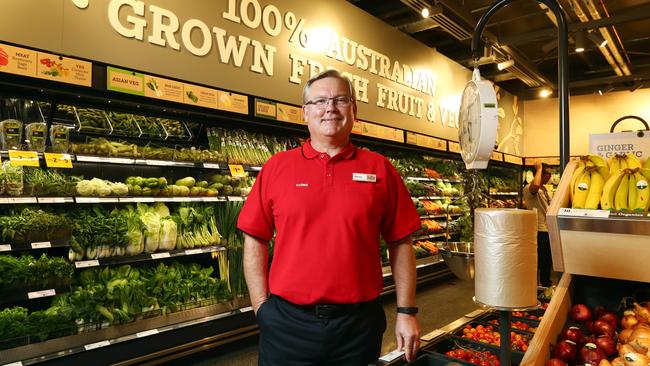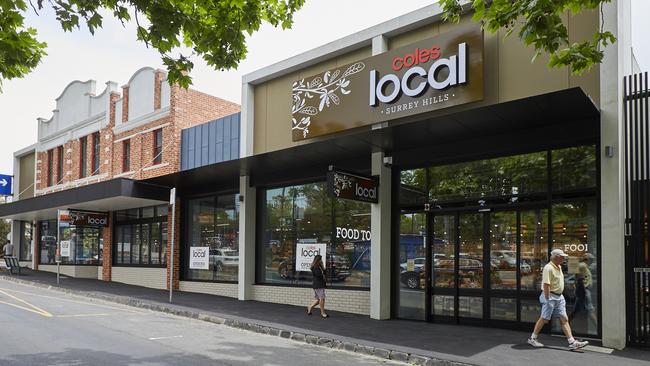Coles targets suburbs for growth with small stores
The supermarket chain will roll out more small format Coles Local stores in response to changes to shopping in the pandemic.

Coles chief executive Steven Cain has declared the supermarket giant is “pressing the accelerator” on the roll out of its suburban Coles Local store formats and significantly ramping up its e-commerce investment to deal with the new realities of Covid-19 and the future of retailing in Australia.
Mr Cain has set his ambition for the supermarket group extremely high, saying it will have as much data in the future as any retailer, helping it better serve customers and offer the best online platform to grab market share from rivals like Woolworths as well as other newer players in groceries such as Amazon.
He will back this ambition with greater investment in stores, technology, data and supply chain with Coles to ratchet up its capital expenditure from $1.1bn this year to $1.4bn in 2022.
While the $300m uplift in capital expenditure next year was later described as peak spending by the supermarket chain, Mr Cain was quick to calm shareholder concerns they could see lighter dividends with investors not forgotten as Coles races ahead with its expansion and technology plans.
This seemed to have rattled some investors as Coles shares slid 5 per cent as Mr Cain unveiled his plans at the supermarket’s strategy day on Thursday, with the stock later closing down 76c, or 4.46 per cent, at $16.29.
Helping to bolster its balance sheet and preserve funds, on the costs side of the business Mr Cain said its ongoing “Smarter Selling” program on track to deliver cumulative benefits in excess of $550m by fiscal 2021.
The Coles boss told investors he wants the supermarket retailer to have a greater presence in the suburbs and areas where more Australians live, especially as Victorians exit the state and Queensland takes on a leading growth profile.
“It recognises a couple of things, the programs we have invested in are paying off, so our renewal and new store programs are working, our investment in technology is working, so then there are a myriad opportunities facing us, the market in Australia is very good for food and liquor and it is growing,” Mr Cain said.
“There are plenty of opportunities, and we think we have got the assets, I think it’s more making sure we have the confidence we have the right returns before pressing the accelerator — and I think what we are saying today is that we are pressing the accelerator.”
The key thrust of Mr Cain’s strategy unveiled on Thursday will see the supermarket accelerate its Coles Local small store suburban format from its current stable of 10 sites across three states to across Australia where it will become a key format for the group.
Mr Cain said the Coles Local format, first opened in Melbourne’s Surrey Hills in 2018 and about half the size of a standard Coles, had been tested and proved.
“One of the reasons it (Coles Local) started was because it became increasingly difficult to find enough space to open full-line coles supermarkets in areas where we could see population growing and it was those inner suburbs,” Mr Cain said on Thursday.
As Covid-19 emerged last year it handed rival Woolworths an advantage as it had a greater proportion of its stores in local suburbs and shopping strips compared to Coles which had more sites in larger shopping centres and malls.
“I think what we’ve seen is that (Coles Local) has certainly helped our performance through Covid and certainly it means that some part of working from home is here to stay so really a lot of Coles Local stores are for us either converted small Coles where the demographics are right and we find lot of singles and couples in those areas.
“We do believe having done the trial and pilot in three states, for almost two years, we are feeling confident that it’s a format that resonates with customers and it’s an opportunity for us to infill sites where populations are growing.
“Coles Local will certainly achieve more (sites) in the suburbs where there is population growth and where people are working from home, what we have announced today is what we saw over those summer months obviously either some people leaving Victoria to go to most notably Queensland or we saw people leaving metro Melbourne to go to holiday homes in regions or the coast.”
And increasingly its ambitious accelerated growth and store roll out goals will be served by Coles billion dollar investments across technology including its automated robotic distribution centres and a better online platform which Mr Cain believes represents among the biggest tech investment in the southern hemisphere.
“When the demerger (from Wesfarmers) happened Coles was not classed as a technology company and I think two years ago and with three more years to go, I think Coles will have transformed into one of the best global tech retailers — and that‘s not just an e-commerce app or mobile, that’s from an automation point of view as well.”
Mr Cain has unveiled his strategic plans for the next two years and made his pitch before investors to speed up the transformation of the supermarket into a global technology focused retailer, with more online services to reach out to the suburbs and regions of Australia where populations are growing in the wake of Covid-19.
This will be driven by Coles delivering its two multi-temperature, highly automated customer fulfilment centres for online orders, one located in each of Melbourne and Sydney, and expected to be operational by 2023.
It has also previously announced its partnership with tech giant Witron to build its robotic workforce to pick, pack and send grocery orders.
Mr Cain said this was one of the biggest tech investments in the southern hemisphere for retail and was not about “keeping up with the Jones’s” but Coles being a leader in its field.
“One of the things that is changing in the future is the cost of automation is significant but so are the returns and therefore it will favour the scale players, and the same with data.
“We will have as much data as anybody in the future, leveraging that data, leveraging automation and that means we are thinking we will very much have a winning strategy – this is not a ‘keeping up strategy’.”
Other plans at Coles include the conversion up to 300 service desks to meet drive-up click and collect orders, setting a goal for a 90-minute “order to pick up” service and adapted check-outs where shoppers can bag their own groceries if desired — a service that proved popular during Covid-19.





To join the conversation, please log in. Don't have an account? Register
Join the conversation, you are commenting as Logout